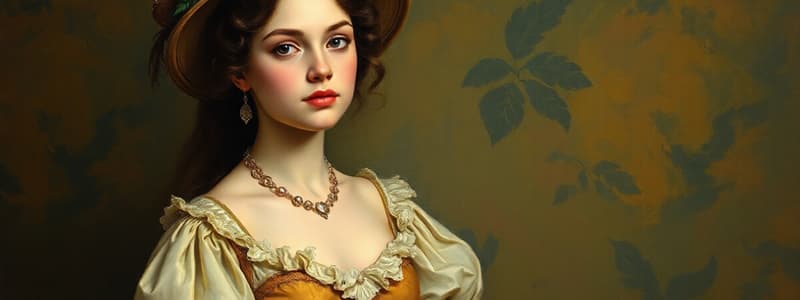Podcast
Questions and Answers
According to Belk, what do our possessions tell us about who we are?
According to Belk, what do our possessions tell us about who we are?
Our possessions tell something about who we are, our self-concept, our past, and even our future.
What are the four components of self as described by William James?
What are the four components of self as described by William James?
- Physical self, Mental self, Emotional self, Spiritual self
- Material self, Social self, Spiritual self, The pure ego (correct)
- Individual self, Collective self, Societal self, Global self
- Body, Mind, Soul, Spirit
The pure ego is a component of self that refers to how we perceive ourselves in relation to others.
The pure ego is a component of self that refers to how we perceive ourselves in relation to others.
False (B)
What characterizes consumer culture?
What characterizes consumer culture?
Consumer culture is inherently personal and individualized.
Consumer culture is inherently personal and individualized.
What is the main problem with consumerism, according to the text?
What is the main problem with consumerism, according to the text?
What are the two ways to avoid the trap of consumerism?
What are the two ways to avoid the trap of consumerism?
What is consumerism?
What is consumerism?
What is consumer culture?
What is consumer culture?
What is a consumerist society?
What is a consumerist society?
What does materialism refer to?
What does materialism refer to?
What is religion?
What is religion?
Spiritual is defined as relating to or affecting the human spirit or soul as opposed to material or physical things.
Spiritual is defined as relating to or affecting the human spirit or soul as opposed to material or physical things.
What is a religious person?
What is a religious person?
What is a spiritual person?
What is a spiritual person?
What is contemplative practice?
What is contemplative practice?
What are the four dimensions of religion?
What are the four dimensions of religion?
Which of the following is NOT a type of ritual?
Which of the following is NOT a type of ritual?
Spiritual experiences always involve a miraculous healing.
Spiritual experiences always involve a miraculous healing.
What are some examples of religious communities identified in the text?
What are some examples of religious communities identified in the text?
What are the two major meditation practices mentioned in the text?
What are the two major meditation practices mentioned in the text?
According to the 1987 Philippine Constitution, who are considered Filipino citizens?
According to the 1987 Philippine Constitution, who are considered Filipino citizens?
Which of the following is NOT considered a strength of the Filipino character?
Which of the following is NOT considered a strength of the Filipino character?
Colonial mentality is considered a strength of the Filipino character.
Colonial mentality is considered a strength of the Filipino character.
Which of the following is a major strength of the Filipino character according to Dr. Patricia B. Licuanan?
Which of the following is a major strength of the Filipino character according to Dr. Patricia B. Licuanan?
Which of the following is NOT considered a Filipino value or trait?
Which of the following is NOT considered a Filipino value or trait?
Proverbs or salawikain are often metaphorical and use formulaic language.
Proverbs or salawikain are often metaphorical and use formulaic language.
What is the difference between a myth and a legend?
What is the difference between a myth and a legend?
According to Lionel Trilling, what is the difference between sincerity and authenticity?
According to Lionel Trilling, what is the difference between sincerity and authenticity?
What are the three domains of the social world in a western-influenced society?
What are the three domains of the social world in a western-influenced society?
What is the digital self?
What is the digital self?
Which of the following is NOT a characteristic of the digital self?
Which of the following is NOT a characteristic of the digital self?
Self-presentation refers to the attempt to control or influence other people's perceptions.
Self-presentation refers to the attempt to control or influence other people's perceptions.
What is the purpose of ingratiation in self-presentation?
What is the purpose of ingratiation in self-presentation?
What is the difference between personal and social identity?
What is the difference between personal and social identity?
Which of the following is an example of a private mental event?
Which of the following is an example of a private mental event?
Flashcards
Material Self
Material Self
The physical aspects of our being, including our body, clothes, family, and home.
Social Self
Social Self
How we see ourselves in relation to others, involving relationships, empathy, and communication.
Consumer Culture
Consumer Culture
A culture characterized by excessive consumption of commercial products and services.
The Problem with Consumerism
The Problem with Consumerism
Signup and view all the flashcards
Materialism
Materialism
Signup and view all the flashcards
Religion
Religion
Signup and view all the flashcards
Spiritual
Spiritual
Signup and view all the flashcards
Religious Person
Religious Person
Signup and view all the flashcards
Spiritual Person
Spiritual Person
Signup and view all the flashcards
Contemplative Practice
Contemplative Practice
Signup and view all the flashcards
Meditation
Meditation
Signup and view all the flashcards
Prayer
Prayer
Signup and view all the flashcards
Yoga
Yoga
Signup and view all the flashcards
Journaling
Journaling
Signup and view all the flashcards
Beliefs
Beliefs
Signup and view all the flashcards
Rituals
Rituals
Signup and view all the flashcards
Spiritual Experiences
Spiritual Experiences
Signup and view all the flashcards
Unique Social Form of Community
Unique Social Form of Community
Signup and view all the flashcards
Judaism
Judaism
Signup and view all the flashcards
Christianity
Christianity
Signup and view all the flashcards
Islam
Islam
Signup and view all the flashcards
Hinduism
Hinduism
Signup and view all the flashcards
Buddhism
Buddhism
Signup and view all the flashcards
Digital Self
Digital Self
Signup and view all the flashcards
Impression Management
Impression Management
Signup and view all the flashcards
Self-promotion
Self-promotion
Signup and view all the flashcards
Ingratiation
Ingratiation
Signup and view all the flashcards
Exemplification
Exemplification
Signup and view all the flashcards
Intimidation
Intimidation
Signup and view all the flashcards
Supplication
Supplication
Signup and view all the flashcards
Study Notes
Material and Economic Self
- Belk argues possessions are part of ourselves, reflecting self-concept, past, and future.
- William James suggests self understanding through components:
- Material self (body, clothes, home)
- Social self (perception in relation to others)
- Spiritual self
- Ego
- Self-feelings and emotions
- Self-seeking and preservation
- Possessions are extensions of the self.
- Consumer culture is a culture of consumption in market society.
- Consumer culture is impersonal, universal, and identifies freedom with private choice.
- Consumer needs are insatiable and unlimited
- Consumer culture helps build identity and status.
- Consumerism is intrusive, manipulative, and unsustainable, restricting choices.
- Avoid traps of consumerism like excess consumption and lack of intellectual independence.
Spiritual and Religious Self
- Religion is a set of beliefs and practices surrounding the sacred.
- Spirituality involves relating to the spiritual or divine.
- Religion involves adherence to God or gods.
- Spiritual individuals may be less focused on beliefs and traditions and prioritize personal experiences of the Divine.
- Contemplative practices include meditation, prayer, yoga, and journaling to cultivate awareness and compassion.
- Religion's characteristics include beliefs (generalized system of values), rituals, spiritual experiences, and unique social formations (denominations, etc.)
Major Religions
- Judaism is characterized by belief in one God (Torah is sacred text).
- Christianity is based on Jesus Christ and has the Bible as scripture.
- Islam has Allah as the one God and the Koran as scripture.
- Hinduism is the oldest religion, involving cycles of birth, death, and rebirth, governed by Karma, and has the Vedas as ancient sacred texts.
- Buddhism's founder is Siddhartha Gautama Buddha and follows wisdom.
The Political Self
- Filipino Citizenship definition (1987 constitution).
- Filipino character strengths: pakikipagkapwa-tao, family orientation, joy, flexibility, hard work, faith, and ability to survive.
- Filipino character weaknesses: extreme personalism, extreme family-centeredness, lack of discipline, passivity, colonial mentality, kanya-kanya syndrome, lack of self-analysis.
- Factors impacting the Filipino character include home environment, social environment, culture, language, history, education, religion, economy, politics, mass media, and leadership.
Filipino Values
- Filipino values and traits include hospitality, respect for elders, close family ties, cheerful personality, self-sacrifice, bayanihan, bahala na attitude, and others.
- Filipino markers include proverbs (salawikain), superstitions, myths, legends (heroes & icons), Filipino markers, how to be a good Filipino, and the digital self concept.
The Digital Self
- The digital self is the online self and is related to thoughts, feelings, and narratives.
- It is retractable and potentially multiplicable due to the online identity structure.
- Self-presentation behaviors in the digital domain aim to manage perceptions and manage online identity and social interactions within a private and public realm. Strategies toward online self presentation such as self-promotion and exemplification and intimidation and supplication can manage perceptions with this online space. Online identities are often partial, with personal identity, and social identity contributing to the totality of the online construct.
Studying That Suits You
Use AI to generate personalized quizzes and flashcards to suit your learning preferences.




